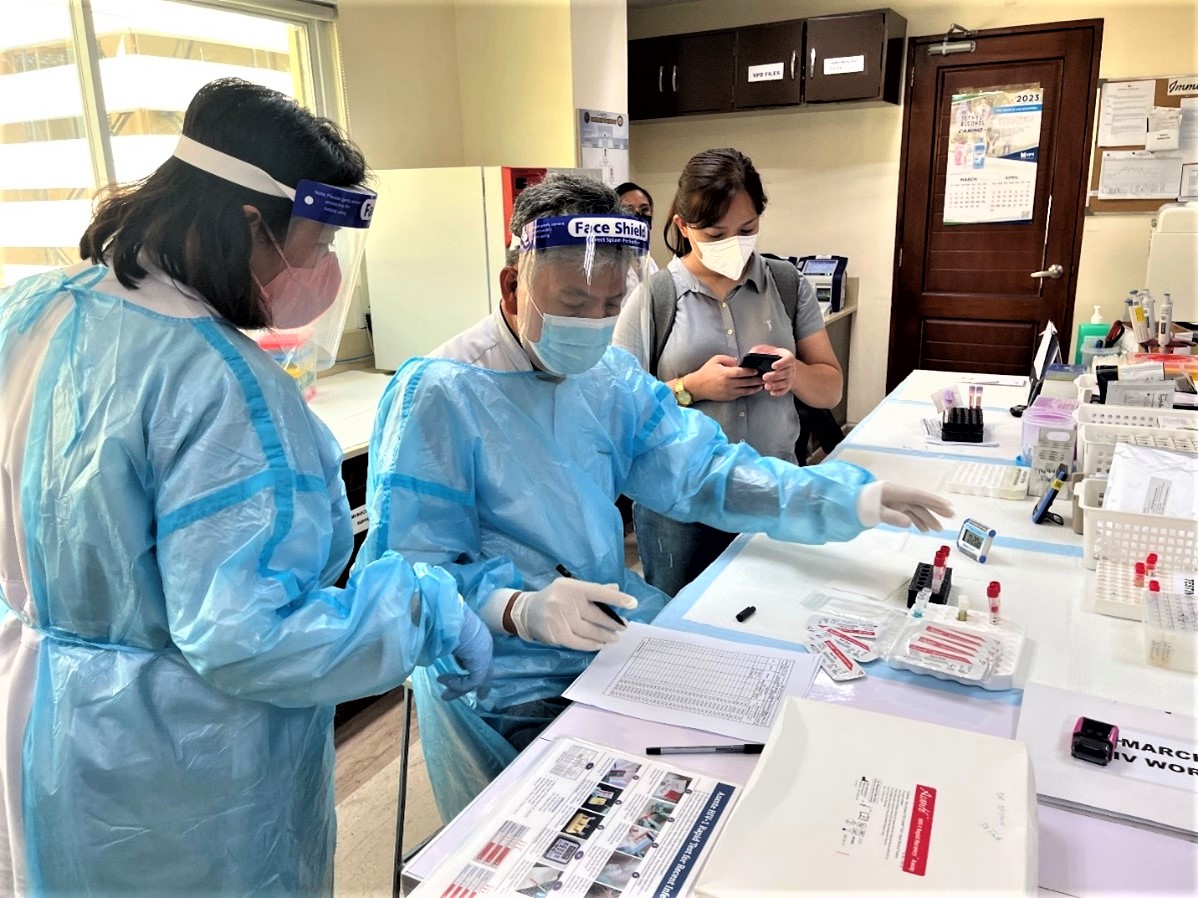In the past decade, the Philippines has experienced the fastest growing rate of new HIV infections in Southeast Asia, registering an increase of over 400 percent in daily incidence between 2012 and 2023. In 2019, as a part of a bigger push to address this problem, the Philippines government began to use a more rapid form of HIV diagnosis called the rapid HIV diagnostic algorithm (rHIVda), with the aim of significantly reducing turnaround time of HIV results to just one day so that HIV positive clients can immediately be linked to treatment and care.
In March 2023, ICAP and its government partners in the Philippines took an important next step by launching an HIV recency surveillance pilot program in 34 health facilities located in three regions with high HIV prevalence. An HIV recency test detects whether an HIV infection was acquired in the past 12 months. When national HIV case reporting systems employ this laboratory-based test, health officials are better able to assess how HIV is being transmitted and to plan accordingly.
With support from the U.S. President’s Emergency Plan for AIDS Relief (PEPFAR) through the U.S. Centers for Disease Control and Prevention (CDC), ICAP launched the recency testing program following 10 months of collaborative work with the Disease Prevention and Control Bureau and Epidemiology Bureau of the Philippines’ Department of Health (DOH), and the National Reference Laboratory—STD AIDS Cooperative Central Laboratory.
“This system will provide crucial granular recent infection data indicative of areas with ongoing active HIV transmission or new hotspots,” said Loreto Roquero Jr., MD, MPH, ICAP’s country director for the Philippines.
“Focused efforts and corresponding resources could then be directed to these areas in support of the country’s aspiration to achieve epidemic control,” added Romel Lacson, PhD, MPH, the CDC’s country director in the Philippines.
ICAP worked with the CDC and the Philippines DOH to develop an HIV recency surveillance protocol. It also procured recency test kits and laboratory supplies, which required navigating a complex international and national process for receiving donations of equipment and shipping it to the health facilities in time for the launch. Additionally, the ICAP team partnered with DOH colleagues to develop an online dashboard to track key trends in recent HIV infections on a nearly real-time basis.
Health worker training formed a key part of ICAP’s support. ICAP co-hosted a five-day HIV Recency Training of Trainers workshop with the CDC at the end of February for 17 laboratory technicians from five of the initial HIV recency testing sites, including the National HIV Reference Laboratory in Manila, and four certified rHIVda confirmatory laboratories, including a medical center and three hospitals. Representatives from the DOH and the World Health Organization also participated in the program-related sessions.
“Being trained by ICAP and the U.S. CDC was a great opportunity for us, especially to our professional growth here in the province,” said Burt Padronia, a laboratory technician who participated in the training. “Data from the recency surveillance will greatly impact our region in terms of HIV program planning and implementation.”
In March, ICAP also hosted an online orientation on HIV recency testing for 210 HIV physicians, counselors, medical technologists, case managers, and peer navigators from all 34 of the participating facilities, covering the basics of HIV recency testing, including processes and data management.
With recency data already starting to come in from the testing sites, health officials say they are eager to analyze the initial findings and use them to improve the country’s HIV programming.
“This initial phase involving three regions will help demonstrate the operationalization of recency surveillance, and from there decide expansion to additional regions in the country and ultimately its integration it into the regular HIV Surveillance System,” said Dr. Alethea de Guzman, director IV of the DOH’s Epidemiology Bureau.
About ICAP
A major global health organization that has been improving public health in countries around the world for two decades, ICAP works to transform the health of populations through innovation, science, and global collaboration. Based at Columbia Mailman School of Public Health, ICAP has projects in more than 40 countries, working side-by-side with ministries of health and local governmental, non-governmental, academic, and community partners to confront some of the world’s greatest health challenges. Through evidence-informed programs, meaningful research, tailored technical assistance, effective training and education programs, and rigorous surveillance to measure and evaluate the impact of public health interventions, ICAP aims to realize a global vision of healthy people, empowered communities, and thriving societies. Online at icap.columbia.edu








